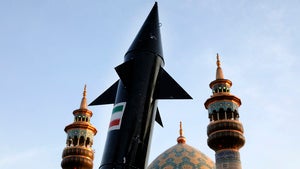Many hesitate to give their opinions on the conflict, but attitudes seem to fall along partisan lines on whether the United States made the right move.
After months of stating his desire to avoid a military confrontation with Iran (though he kept all options on the table), President Donald Trump shocked the world this past weekend by authorizing US forces to use their largest and most lethal conventional bombs against three Iranian nuclear facilities. The move followed a week of Israeli airstrikes against Iranian military leaders, scientists, and nuclear sites, and retaliatory Iranian strikes against Israel.
A June 20–23 joint survey conducted by the Chicago Council on Global Affairs and Ipsos indicates that Americans are more likely to oppose than support US strikes on Iran’s nuclear facilities, but a significant percentage are unsure. If Iran were to escalate the situation against US forces in the region, a narrow majority of Americans support carrying out airstrikes in response, but there is little interest in using US troops to overthrow the Iranian government. Americans’ hesitation to use force against Iran reflects an underlying preference to find a diplomatic solution to limiting or ending Iran’s nuclear program.
Key Findings
- Large percentages of Americans, often pluralities, haven’t heard enough to provide opinions on the developing situation.
- More Americans oppose (35%) than support (27%) the United States using “bunker busting” weapons to weaken Iran’s ability to develop nuclear weapons (polling after the announcement that the bomb was employed shows support increased from 25% to 32%).
- The US public is slightly more likely to say Israel was justified (32%) than unjustified (27%) in attacking Iranian nuclear sites.
- Asked whether Iran was justified in retaliating against Israel, the US public is closely divided (30% justified, 27% not).
- While a narrow majority support carrying out airstrikes in response to potential Iranian escalation against US forces in the region, they oppose the use of US troops to overthrow the Iranian government.
- There are clear partisan divides on each question regarding the conflict and how the United States should respond if Iran attempts to harm US troops in the region, with Republicans in favor of bombing Iran and Democrats and Independents more divided, if not opposed.
Slight Majority of US Public Following Israel-Iran Conflict Closely
Americans have a longstanding concern over nuclear proliferation, rating “limiting the spread of nuclear weapons” a top goal whenever this item has been included in Chicago Council Surveys since 1994. In the annual 2024 Council Survey, three-quarters of Americans said preventing the spread of nuclear weapons is a very important foreign policy goal. When asked about Iran’s nuclear program specifically, majorities are inclined to say it is a critical threat to the United States, but levels of concern have dropped considerably since 2010 when the question was first included in the annual Chicago Council Survey (from 68% in 2010 to 53% in 2024).
The poll was conducted June 20–23, and the US attacks were announced by President Trump on social media at 7:46 p.m. (EDT) on June 21. A slight majority of Americans (52%) say they are following the news about the conflict between Israel and Iran closely (18% very closely, 34% somewhat). Self-described Republicans are following most closely (58%), though Democrats (51%), and Independents (50%) are also following these developments. Attention seemed to increase after the US strike (from 50% before the public announcement of the attack to 59% after).
Slightly More Americans Say Israel Was Justified than Not to Attack Iran
When asked about Israel’s initial attacks against Iranian nuclear and missile facilities, which killed several Iranian military commanders and nuclear scientists, a plurality of Americans (38%) say they haven’t heard enough to express their views. Those who do provide an opinion are slightly more likely to say Israel was justified (32%) than unjustified (27%). Those who are following the situation closely are more likely to consider Israeli action justified (47% vs. 16% not following closely).
Moreover, only 32 percent of Americans now say Israel is playing a positive role in resolving the key problems in the Middle East, the lowest level recorded since the Chicago Council first asked this question in 2015 (when 49% said Israel played a positive role—see figure).
Partisan differences on the issue of Israel have sharpened since its large-scale incursion into Gaza in the wake of Hamas’s October 7 attacks. While a majority of Republicans say Israel is playing a positive role (62%, similar to previous polling), only 10 percent of Democrats agree (a plunge from 40% in 2015). And while 55 percent of Republicans say Israel was justified in preemptively attacking Iran’s nuclear sites, just 16 percent of Democrats and 27 percent of Independents agree.
Divided Opinion on Whether Iran’s Retaliation Against Israel is Justified
Similar to the question about Israeli military action, 40 percent of Americans say they do not know enough to comment on Iran’s retaliation against Israel. While three in 10 overall say Iran was justified in this action (30%), nearly as many say it was not (27%). Those who are following the situation are inclined to say Iran was justified (42% vs. 17% among those not following closely).
Despite this division in public opinion, Americans are fairly aligned in their views that Iran is a negative actor when it comes to resolving problems in the Middle East, even more so than in previous polling: just 9 percent of Americans say Iran plays a positive role, compared to 84 percent who see Iran playing a negative role in the region (see figure and appendix 1).
Breaking down the results by partisan affiliation, a plurality of Republicans say Iran was not justified in retaliating (42% vs. 21% justified). But other partisans are not as decisive. Democrats are more likely to say Iran was justified than not (35% to 20%); in fact, more Democrats view Iran’s escalation as justified than say the same about Israel’s initial attacks against Iran. Independents view Iran’s retaliation similarly, with more saying it was justified (33%) than unjustified (23%); more Independents also view Iran’s retaliation as more justified than Israel’s attack on Iran.
More Americans Oppose than Support US Strikes on Iranian Nuclear Facilities
In the run-up to the actual decision to bomb Iranian nuclear sites, many experts wondered whether Trump would or would not use GBU-57s, the “bunker buster bombs” designed specifically for underground targets, to assist Israel in attacking Iran’s nuclear weapons research facilities. Last weekend’s use was the first time they have ever been employed in combat.
When asked whether they support or oppose using these weapons to weaken Iran’s ability to develop nuclear weapons, more Americans oppose than favor (35% to 27% favor) their use. But a slight plurality do not know enough to respond (37%). Those who are following the news around the situation are more closely divided, with a slight plurality opposing (41% oppose, 37% favor).
As the figure above illustrates, Republicans tend to favor the use of these weapons (52% vs. 14% oppose). In contrast, Democrats tend to oppose (51% vs. 13% favor). Independents are also on balance opposed (38% vs. 20% favor). And many, across partisan lines, say they do not know enough to say.
But military force was not the public’s first choice in addressing Iran’s nuclear program. A Chicago Council-Ipsos survey conducted in April 2025 found a large and bipartisan majority of Americans agreeing that Iran obtaining a nuclear weapon is unacceptable (79% oppose, 16% support). But they favored taking diplomatic steps much more than military action to prevent Iran from developing its nuclear weapons program.
Specifically, eight in 10 favored US diplomatic efforts to persuade Iran to stop enriching uranium (83%) and increasing economic sanctions on Tehran (80%) to limit further nuclear enrichment. A smaller majority of Americans endorsed US participation in an agreement that lifts some international economic sanctions against Iran in exchange for strict limits on its nuclear program (61%, including 78% of Democrats, 62% of Independents and 40% of Republicans). While six in 10 also favored US use of cyberattacks to rein in Iranian aspirations for a nuclear weapons program (59%), about half approved of using airstrikes (48%) and just 35 percent favored sending US troops to destroy Iranian nuclear facilities. A May 2–5 survey conducted by the University of Maryland also found solid majorities across the political spectrum in favor of a negotiated agreement limiting Iran’s nuclear program to peaceful ends (64%) over military action in an attempt to destroy Iran’s nuclear program (24%).
In any case, the public’s opinion of the US role in the Middle East has tanked since previous polling. At this point, only 44 percent of Americans say the United States is playing a positive role in resolving the problems of the Middle East, down from 50 percent last April and 69 percent in 2015.
US Strikes See Limited Effect on Public Opinion
Prior to Trump’s announcement of the attack, only a quarter of Americans (25%) favored such strikes. After the announcement, public support rose to 32 percent. Opposition, before and after the US strike, remained around 35 percent, and those saying they did not know enough to respond declined from 39 percent to 32 percent.
Limited Support for US Retaliation against Iranian Attacks
Following the US strikes on Iran’s nuclear facilities, Iran conducted retaliatory strikes aimed at US bases in Qatar—though as Tehran warned the Qataris in advance of the strikes, they were mainly symbolic and no casualties were reported. This was followed by announcements from Trump and Iranian Foreign Minister Abbas Araghchi of a ceasefire between Iran and Israel—which, despite claims of violations by both sides, seems to be holding.
Iran’s preannounced strikes at US forces in Qatar were widely interpreted as a deliberate attempt to deescalate the situation. However, it remains unclear how stable a ceasefire will be—and further escalation could be on the table.
Should Iran attack US military or diplomatic personnel in the Middle East, a majority of Americans would support further airstrikes against Iran’s military facilities (56%, 38% opposed). Slightly more favor than oppose carrying out targeted assassinations of Iranian military personnel (49%, favor, 44% oppose). And majorities oppose sending US troops to Iran either for a punitive strike on Iran’s military facilities (55% oppose, 39% support) or to overthrow the Iranian government (63% oppose, 31% support). Those who are following the situation closely are even more likely than average to favor conducting airstrikes (63%) and carrying out targeted assassinations (56%) but share the overall public’s reluctance to send US troops to Iran (38% to destroy military facilities, 30% for regime change).
As with many questions related to Iran, however, there are sharp partisan divisions. Throughout the Council’s research, Republicans have been more likely than other partisans to view Iran’s nuclear program as a critical threat, and more likely to view Iran negatively overall. Should Iran attack US forces in the region, Republicans would broadly favor a variety of US retaliatory actions including airstrikes against Iran’s military facilities, assassinations of Iranian personnel, and the use of US troops to destroy Iranian military infrastructure. Half of Republicans (51%) even go so far as to endorse a US-led overthrow of the Iranian government. By contrast, none of these response options receive majority support among Democrats or Independents. Those including the deployment of US troops to Iran are the least popular, with large majorities of Democrats and Independents in opposition (see appendix 1 for full results).
Conclusion
Like the rest of the world, the survey respondents interviewed for this poll may have been caught off guard and not yet fully aware or informed about the specifics of the US attack against Iran. Findings show that those willing to express a view are closely divided and lean toward opposing last weekend’s US military action against Iran. This hesitance makes sense given the public’s preference (and, at least initially, the US administration’s preference) to find a diplomatic means to limit Iran’s uranium enrichment.
And though some experts predicted Americans would ‘rally around the flag’ following the airstrikes on Iran’s nuclear facilities, that does not appear to have happened—and the public remains opposed to further escalations by the United States. As the world awaits the next developments, surveys seem to demonstrate that Americans would like their government to refrain from entering another protracted conflict in the Middle East.
This analysis is based on data from a joint Chicago Council on Global Affairs-Ipsos survey. The survey was conducted June 20-23, 2025, using Ipsos’ large-scale, nationwide, online research panel, KnowledgePanel, among a weighted national sample of 1,144 adults 18 or older living in all 50 US states and the District of Columbia. The margin of sampling error for the full sample is ±3.0 percentage points, including a design effect of 1.08.
The data for the total sample were weighted to adjust for gender by age, race/ethnicity, education, Census region, metropolitan status, and household income using demographic benchmarks from the 2024 March Supplement of the Current Population Survey (CPS).
Specific categories used were:
- Gender (Male, Female) by Age (18–29, 30–44, 45-59 and 60+)
- Race/Hispanic Ethnicity (White Non-Hispanic, Black Non-Hispanic, Other, Non-Hispanic, Hispanic, 2+ Races, Non-Hispanic)
- Education (Less than High School, High School, Some College, Bachelor or Higher)
- Census Region (Northeast, Midwest, South, West)
- Metropolitan Status (Metro, Non-Metro)
- Household Income (Under $25,000, $25,000–$49,999, $50,000–$74,999, $75,000–$99,999, $100,000–$149,999, $150,000+)
Appendix 1: Survey Topline
Question 325A
Q325A. In your opinion, are the following countries playing a very positive, somewhat positive, somewhat negative or very negative role in resolving the key problems facing the Middle East?
| Overall | Republican | Democrat | Independent | R-D Gap | |
|---|---|---|---|---|---|
| 2015 | 69 | 69 | 74 | 65 | -5 |
| 2024 | 61 | 68 | 66 | 52 | 2 |
| April 2025 | 50 | 81 | 34 | 43 | 47 |
| June 2025 | 44 | 80 | 19 | 36 | 61 |
| Overall | Republican | Democrat | Independent | R-D Gap | |
|---|---|---|---|---|---|
| 2015 | 17 | 10 | 22 | 18 | -12 |
| 2024 | 11 | 10 | 12 | 12 | -2 |
| April 2025 | 8 | 6 | 10 | 8 | -4 |
| June 2025 | 9 | 10 | 5 | 10 | 5 |
| Overall | Republican | Democrat | Independent | R-D Gap | |
|---|---|---|---|---|---|
| 2015 | 49 | 60 | 40 | 47 | 20 |
| 2024 | 39 | 60 | 27 | 33 | 33 |
| April 2025 | 34 | 60 | 19 | 29 | 41 |
| June 2025 | 32 | 62 | 10 | 28 | 52 |
| Overall | Republican | Democrat | Independent | R-D Gap | |
|---|---|---|---|---|---|
| 2015 | 40 | 39 | 40 | 38 | -1 |
| 2024 | 33 | 33 | 33 | 33 | 0 |
| April 2025 | 28 | 30 | 24 | 29 | 6 |
| June 2025 | 30 | 44 | 17 | 29 | 27 |
Summary of Q325A – 2025 FP2 data only
| Overall | Republican | Democrat | Independent | R-D Gap | |
|---|---|---|---|---|---|
| United States | 44 | 80 | 19 | 36 | 61 |
| Iran | 9 | 10 | 5 | 10 | 5 |
| Israel | 32 | 62 | 10 | 28 | 52 |
| Saudi Arabia | 30 | 44 | 17 | 29 | 27 |
| Overall | Republican | Democrat | Independent | R-D Gap | |
|---|---|---|---|---|---|
| United States | 50 | 15 | 75 | 57 | -60 |
| Iran | 84 | 85 | 87 | 81 | -2 |
| Israel | 61 | 34 | 82 | 65 | -48 |
| Saudi Arabia | 61 | 50 | 74 | 60 | -24 |
Question 2i
Q2i. How closely are you following news about the conflict between Israel and Iran?
| Overall | Republican | Democrat | Independent | R-D Gap | |
|---|---|---|---|---|---|
| Very closely | 18 | 21 | 17 | 17 | 4 |
| Somewhat closely | 34 | 37 | 35 | 33 | 2 |
| Not too closely | 31 | 26 | 36 | 31 | -10 |
| Not at all closely | 15 | 16 | 11 | 18 | 5 |
Question 729.
Q729. As you may know, Israel launched an attack on Iran’s nuclear and missile facilities, killing several Iranian military commanders and nuclear scientists. Iran retaliated with ballistic missiles and the two countries have since exchanged several rounds of airstrikes. Do you think each of the following actions is justified or unjustified?
| Overall | Republican | Democrat | Independent | R-D Gap | |
|---|---|---|---|---|---|
| Justified | 32 | 55 | 16 | 27 | 39 |
| Unjustified | 27 | 10 | 40 | 30 | -30 |
| I don’t know enough to say | 38 | 33 | 42 | 40 | -9 |
| Overall | Republican | Democrat | Independent | R-D Gap | |
|---|---|---|---|---|---|
| Justified | 30 | 21 | 35 | 33 | -14 |
| Unjustified | 27 | 42 | 20 | 23 | 22 |
| I don’t know enough to say | 40 | 35 | 43 | 41 | -8 |
Question 731
Q731. The United States possesses the only “bunker buster bomb” powerful enough to destroy Iran’s underground nuclear facilities. Do you favor or oppose US forces using this weapon to weaken Iran’s ability to develop nuclear weapons?
| Overall | Republican | Democrat | Independent | R-D Gap | |
|---|---|---|---|---|---|
| Justified | 27 | 52 | 13 | 20 | 39 |
| Unjustified | 35 | 14 | 51 | 38 | -37 |
| I don’t know enough to say | 37 | 33 | 35 | 41 | -2 |
Question IR1
QIR1. If Iran attacks US military or diplomatic personnel in the Middle East, would you strongly support, somewhat support, somewhat oppose, or strongly oppose the US taking each of the following actions:
| Overall | Republican | Democrat | Independent | R-D Gap | |
|---|---|---|---|---|---|
| January 2020 | 69 | 90 | 54 | 66 | 36 |
| June 2025 | 56 | 79 | 45 | 48 | 34 |
| Overall | Republican | Democrat | Independent | R-D Gap | |
|---|---|---|---|---|---|
| January 2020 | 58 | 84 | 36 | 56 | 48 |
| June 2025 | 49 | 72 | 38 | 42 | 34 |
| Overall | Republican | Democrat | Independent | R-D Gap | |
|---|---|---|---|---|---|
| January 2020 | 50 | 68 | 39 | 44 | 29 |
| June 2025 | 39 | 58 | 28 | 33 | 30 |
| Overall | Republican | Democrat | Independent | R-D Gap | |
|---|---|---|---|---|---|
| January 2020 | 35 | 52 | 26 | 29 | 26 |
| June 2025 | 31 | 51 | 18 | 27 | 33 |
Summary of QIR1 – 2025 FP 5 data only
| Overall | Republican | Democrat | Independent | R-D Gap | |
|---|---|---|---|---|---|
| Conduct airstrikes against Iran’s military facilities | 56 | 79 | 45 | 48 | 34 |
| Carry out targeted assassinations of Iranian military personnel | 49 | 72 | 38 | 42 | 34 |
| Send US troops to destroy Iran’s military facilities | 39 | 58 | 28 | 33 | 30 |
| Send US troops to overthrow the Iranian government | 31 | 51 | 18 | 27 | 33 |
| Overall | Republican | Democrat | Independent | R-D Gap | |
|---|---|---|---|---|---|
| Conduct airstrikes against Iran’s military facilities | 38 | 18 | 49 | 43 | -31 |
| Carry out targeted assassinations of Iranian military personnel | 44 | 26 | 55 | 49 | -29 |
| Send US troops to destroy Iran’s military facilities | 55 | 39 | 67 | 58 | -28 |
| Send US troops to overthrow the Iranian government | 63 | 46 | 76 | 65 | -30 |
Appendix 2: Opinions Among Americans Following Conflict Closely
Q2i. How closely are you following news about the conflict between Israel and Iran?
Question 325A.
Q325A. In your opinion, are the following countries playing a very positive, somewhat positive, somewhat negative or very negative role in resolving the key problems facing the Middle East?
| Overall | Following somewhat + very closely | Not following too closely or at all | |
|---|---|---|---|
| United States | 44 | 49 | 39 |
| Iran | 9 | 8 | 10 |
| Israel | 32 | 42 | 22 |
| Saudi Arabia | 30 | 38 | 22 |
| Overall | Following somewhat + very closely | Not following too closely or at all | |
|---|---|---|---|
| United States | 44 | 48 | 52 |
| Iran | 9 | 89 | 81 |
| Israel | 32 | 55 | 68 |
| Saudi Arabia | 30 | 57 | 68 |
Question 729
Q729. As you may know, Israel launched an attack on Iran’s nuclear and missile facilities, killing several Iranian military commanders and nuclear scientists. Iran retaliated with ballistic missiles and the two countries have since exchanged several rounds of airstrikes. Do you think each of the following actions is justified or unjustified?
| Overall | Following somewhat + very closely | Not following too closely or at all | |
|---|---|---|---|
| Justified | 32 | 47 | 16 |
| Unjustified | 27 | 32 | 21 |
| I don’t know enough to say | 38 | 20 | 61 |
| Overall | Following somewhat + very closely | Not following too closely or at all | |
|---|---|---|---|
| Justified | 30 | 42 | 17 |
| Unjustified | 27 | 35 | 19 |
| I don’t know enough to say | 40 | 22 | 62 |
Question 731
Q731. The United States possesses the only “bunker buster bomb” powerful enough to destroy Iran’s underground nuclear facilities. Do you favor or oppose US forces using this weapon to weaken Iran’s ability to develop nuclear weapons?
| Overall | Following somewhat + very closely | Not following too closely or at all | |
|---|---|---|---|
| Justified | 27 | 37 | 17 |
| Unjustified | 35 | 41 | 29 |
| I don’t know enough to say | 37 | 22 | 54 |
Question IR1
QIR1. If Iran attacks US military or diplomatic personnel in the Middle East, would you strongly support, somewhat support, somewhat oppose, or strongly oppose the US taking each of the following actions:
| Overall | Following somewhat + very closely | Not following too closely or at all | |
|---|---|---|---|
| Conduct airstrikes against Iran’s military facilities | 56 | 63 | 50 |
| Carry out targeted assassinations of Iranian military personnel | 49 | 55 | 44 |
| Send US troops to destroy Iran’s military facilities | 39 | 38 | 41 |
| Send US troops to overthrow the Iranian government | 31 | 30 | 34 |
| Overall | Following somewhat + very closely | Not following too closely or at all | |
|---|---|---|---|
| Conduct airstrikes against Iran’s military facilities | 38 | 34 | 43 |
| Carry out targeted assassinations of Iranian military personnel | 44 | 42 | 48 |
| Send US troops to destroy Iran’s military facilities | 55 | 59 | 51 |
| Send US troops to overthrow the Iranian government | 63 | 68 | 59 |







Related Content
 US Foreign Policy
US Foreign Policy
Majorities of Democrats and Independents support a potential deal similar to the 2015 Joint Comprehensive Plan of Action, but only a minority of Republicans agree.
 Defense and Security
Defense and Security
Were Israel's strikes on Iran preemptive or preventative? Paul Poast weighs in on why the semantics are significant.
 Public Opinion
Public Opinion
To address the Red Sea attacks, Americans would rather use economic sanctions to force the Houthis (and Iran) to concede the waters.

